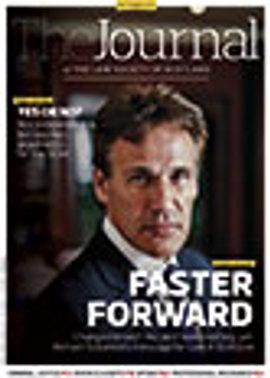Rights undone
On 3 July 2013, the UK Supreme Court overturned a long line of patent law authorities dating back to the early 1900s by unanimously allowing the appeal in Virgin Atlantic Airways v Zodiac Seats UK [2013] UKSC 46.
The case law prior to this decision was clear: a defendant, found to have infringed a patent, was liable to pay damages even if the patent was later revoked. The Supreme Court in Virgin arrived at the opposite conclusion, and held that a defendant is not liable to pay damages if the patent in suit is later revoked, or is amended retrospectively so as to remove the claims said to have been infringed.
This article looks at the legal principle established by the Virgin case, and considers what this might mean for Scots law practitioners.
Res judicata?
Virgin sued Zodiac for a sum exceeding £49,000,000 for infringing its European patent for a reclining airline seat.
The case was litigated through the English courts. At the same time, the validity of the patent in suit was being litigated separately before the European Patent Office (“EPO”). Such concurrent proceedings are fairly common in patent litigations, because the EPO cannot hear infringement proceedings whereas the national courts can. Also, the UK courts’ decisions on validity are binding in the UK only, whereas the EPO’s decisions on validity take effect throughout the EU.
The Court of Appeal (“CA”) found that the patent was valid and had been infringed by Zodiac, and ordered an enquiry as to damages. However, subsequent to this, the Technical Board of Appeal of the EPO (“TBA”) arrived at the opposite conclusion, and ruled the relevant claims invalid.
The TBA’s decision retrospectively amended the patent so as to remove all relevant claims as from the date of grant. Thus, essentially, Virgin was seeking to claim damages for infringement of a patent which was deemed never to have existed in the form found to have been infringed.
Virgin argued that it was entitled to recover damages for infringement regardless of the TBA’s decision, because the CA’s decision was res judicata as between Virgin and Zodiac on the subsequent assessment of damages.
The CA, bound by a doctrine established in 1908 and most recently affirmed in Unilin
Beheer v Berry [2007] EWCA Civ 364, decided in favour of Virgin. Zodiac appealed to the Supreme Court.
Overruled
The Supreme Court held that the previous line of authority was incorrect. It concluded that the CA in previous cases was “wrong to suppose that the court would be rehearing on the enquiry the question of validity decided by the judgment on liability. The revocation of the patent was an act in rem which determined the status of the patent as against the world. It had been revoked by the authority which had granted it and must be treated as never having existed. Although the patent had been revoked on the ground of invalidity, the issue which the defendant wished to raise on the enquiry was not invalidity but revocation”.
Thus, Zodiac was entitled to rely on the amended patent when answering the enquiry as to damages.
The effect of this is that a defendant is no longer liable to pay damages if, before the enquiry into damages takes place, the TBA subsequently rules that the claims held to have been infringed are invalid.
Consequences in Scotland
Where a defender is found to have infringed a patent, and the TBA later makes a declaration of invalidity in respect of the relevant claims, the defender will not have to pay damages, if damages have not already been paid.
This raises an interesting question: what will happen if a defender has paid damages, and subsequently there is a TBA ruling in their favour? Could the defender rely on the doctrine of unjustified enrichment to claim back the damages paid? This issue is yet to come before the Scottish courts, but it will be interesting to see how the case law develops in light of Virgin.
Virgin may also change the way the courts deal with requests for a stay/sist of proceedings pending a decision of the TBA. To date, the courts have been reluctant to grant stays/sists because of the slow nature of TBA proceedings. This could now be set to change. The courts will be keen to avoid decisions which are subsequently overturned by the TBA. Perhaps the appropriate way forward is to allow the proceedings to continue, but to stay/sist the enquiry into damages pending the final outcome of TBA proceedings.
In this issue
- Scotland: a patently obvious choice?
- Bringing order to family law
- Third party rights: behind the times
- Judicial review: closer to the surface
- A time for talent spotting
- Fixing fixed equipment (full version)
- Reading for pleasure
- Book reviews
- Profile
- President's column
- Moving up the gears
- Justice redefined
- Sep rep: decision time
- Petrodel: could it happen here?
- Clicks forward
- Cover lines
- Family time
- Fixing fixed equipment
- Rights undone
- Directors: not in name only
- Not quite joined up
- Heritage disowned
- Time to start growing your own?
- Are you keen to be mentored?
- LBTT: in with the new
- How not to win business: a guide for professionals
- Ask Ash
- Forum is place to flag up problems
- Scottish Barony Register fee rise
- From the Brussels office
- Law reform roundup
- Diary of an innocent in-houser






